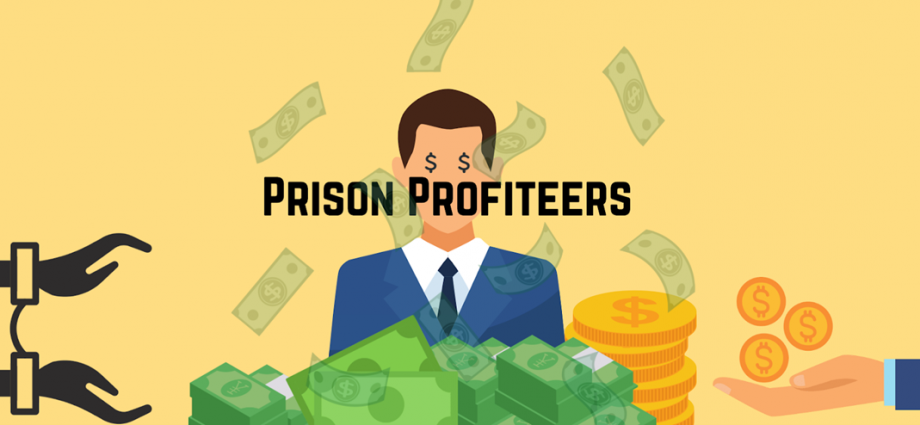Author: Vaishali Bansal, Graphics: Acasia Giannakouros
The BRB Bottomline
Although it may not seem like it, the prison industry is one of the most profitable businesses in the United States, raking in over $74 billion a year. This article dives into this morally gray industry and the detrimental effect it has on people of color throughout the United States.
There are over 2 million prisoners in the United States, the highest number of incarcerated people per capita in any country. Over the last four decades, its incarceration rate has grown exponentially: a 500% increase that has left prisons overflowing throughout the nation. This rapid growth disproportionately impacts marginalized communities–40 percent of inmates are people of color. This rise in incarceration is not a subsequent result due to a rise in crime, but rather a strategic ploy to line the pockets of prison corporations and other involved parties.
Private Prisons
For private prisons that have been contracted by the federal government, every additional person brings in more money. Inmates are often treated as simply a stream of revenue, rather than human beings. This attitude is incredibly harmful to the state of the nation; big prison corporations are motivated to increase the number of people behind bars and keep recidivism rates high. For instance, the population in private prisons has increased by a total of 32% while the overall prison population, including public facilities, has only increased by a meager 3%. This significant disparity in the data goes to show how these for-profit prisons are taking advantage of their power and influence to keep more people in jail.
Other Ways to Make a Profit
Several other companies have partnered with these private prisons in order to make an easy profit off of millions of inmates. GTL, formerly known as Global-Tel Link, is one of the biggest telecommunication companies in the prison sector, generating close to 500 million dollars annually in sales and contracts with prisons. For years, GTL has been taking advantage of the basic human desire to connect; inmates and their families are forced to pay exorbitant prices in order to have a simple phone call or video chat with their loved ones. According to the Prison Policy Initiative, households in America pay about a billion dollars each year to talk to family members in prison. In 2013, GTL would charge about $1.13 per minute, amounting to 17 dollars for a 15-minute phone call. Due to heavy backlash, GTL reduced their prices on the surface, however, the true cost is still hidden behind dark patterns and “one-time charges” that limit understanding and confuse consumers into paying more than they should. For women and families of color, who disproportionately know incarcerated individuals, corporations like GTL are directly reducing their wealth and pushing them further into debt.
Furthermore, Corizon, a for-profit healthcare company is one of the biggest players in the prison industry, and supplies medical care to ill patients. However, Corizon has faced over 1000 lawsuits from prisoners and their families, claiming to have received less than adequate, if any care at all. Especially for terminally ill and long-term patients, Corizon has a long history of denying proper care in order to keep their costs as low as possible. For instance, Corizon kept delaying the treatment of cancer patient and inmate, Walter Jordan, who ultimately died in prison as a result. Walter Jordan’s story is not unique; hundreds of prisoners are dying in their jail cell due to a lack of proper medical care.
The Bail Industry
Many people also forget about the for-profit bail industry, where bail bondsmen and insurance companies make billions of dollars off of poor individuals who are unable to afford bail. Low-income families of color are disproportionately driven deeper into debt as they are forced to pay non-refundable fees to insurance companies to afford the bail amount. Research conducted by CNBC found that the bail industry generates over 2 billion dollars a year. However, along with the revenue, this industry is also generating racial and economic inequality in the United States at a scale never seen before.
As more companies begin to recognize this potential for high profits, the prison sector has started to experience exponential growth. Unfortunately, this revenue increase comes at a high price–corporations like GTL and Corizon are directly fueling mass incarceration and shifting the country further into a state of chaos and hardship for its marginalized communities of color.
Change must be enacted, for the sake of this country and the low-income families of color that are disproportionately impacted. Only when the government starts prioritizing people over profit, will the prison industrial complex fall. An emphasis on rehabilitation and development, rather than punishment and crime will uplift American communities throughout the nation. We have to change our perspectives and start treating incarcerated individuals like what they truly are: not cash, but human-beings capable and deserving of change.
Take-Home Points
- The prison population has grown exponentially since the 1980, establishing the United States as the country with the highest incarceration rate.
- This rise in prisons and incarcerated individuals is a result of private corporations who are able to make significant revenue through capitalizing off of poor inmates.
- Companies are taking advantage of low-income families and inmates and forcing them to pay high prices for bail, proper legal defense, and phone calls.
- Private corporations that rely on prison facilities for their profits are intentionally fueling mass incarceration and low recidivism rates.
- People of color are disproportionately affected by mass incarceration.

